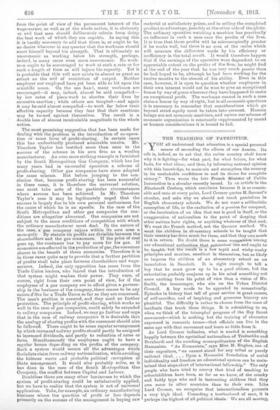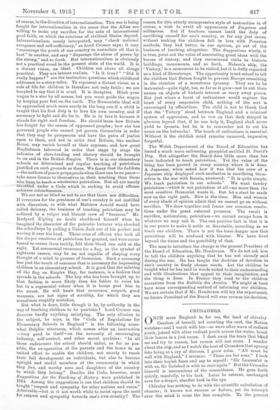THE TEACHING OF PATRIOTISM.
" yOU all understand that education is a special personal means of seconding the efforts of our Armies. Its rae is, indeed, so to act that the entire country shall know why it is fighting—for what past, for what future, for what facts, for what ideas; and thus, by informing national opinion with this knowledge, to maintain and strengthen the country in its unshakable confidence in and its desire for complete victory." Thus wrote the late French Minister of Public Instruction in a circular recently issued. In an article in the Nineteenth Century, which convinces because it is so reason- able and sane at every point, Lord Cromer quotes M. Sarraut's circular, and asks why we should not teach patriotism in English elementary schools. We do not want a militaristic conception of life, or the exaltation of a passion for conquest, or the inculcation of an idea that war is good in itself, or the exaggeration of nationalism to the point of denying that other nations have rights, or anything whatever of that sort. We want the French method, not the German method. We want the children in elementary schools to be taught that their country has done much for them, and that they owe muola to it in return. No doubt there is some recognition among our educational authorities that patriotism can and ought to be taught, but the result is a few tepid and wishy-washy principles and maxims, excellent in themselves, but as likely to impress the children of an elementary school as an incantation in Sanskrit. It is right enough to tell a boy that he must grow up to ba a good citizen, but the exhortation probably conjures up in his mind something not more exciting from his point of view than a vision of Mr. Smith, the ironmonger, who sits on the Urban District Council. A boy needs to be appealed to romantically.' Episodes in history that tell of great service in great causes, of self-sacrifice, and of inspiring and generous bravery are plentiful. The difficulty is rather to choose from the mass of incidents that teach those things. It is astonishing to us, when we think of the triumphal progress of the Boy Scout movement—which is nothing but the training of character expressed in romantic terms—that officials can live in the same age with that movement and learn so little from it.
As Lord Cromer indicates, what is needed is something happily between the egotistical nationalism of Treitschke and Bernhardi and the numbing cosmopolitanism of the English Humanists. "As Humanists," says Miss M. Hughes, one of their expositors, "we cannot stand for any tribal or purely national ideal. . . . Upon a Humanist foundation of social individuality and freedom no educational system can be main- tained that stops short of international fellowship." The only people who have tried to convoy that kind of teaching to schoolchildren have been, so far as we know, of the cranky and faddy type who end in instructing children that they owe more to other Countries than to their own. Like Lord Cromer, we recognize that internationalism presents a very high ideal, Connoting a brotherhood of man, it is perhaps the highest of all political ideals: We are all moving, of course, in the direction of internationalism. This war is being fought for internationalism in the sense that the Allies are willing to make , any sacrifice for the sake of international good faith, on which the relations of civilized States depend. Internationalism, sanely interpreted, may "check national arrogance and self-sufficiency," as Lord Cromer says ; it may "encourage the youth of one country to assimilate all that is best" in another, and may "disparage the abuse of power by the strong," and so forth. But internationalism is obviously not a praotioal creed in the present state of the world. It is a distant vision, an ideal. Children are above all things practical. They are intense realists. "Is it true P " "Did it really happen? " are the instinctive questions which childhood addresses to a story-teller. To represent a distant vision as a rule of life for children is therefore not only futile ; we are tempted to say that it is cruel. It is deceptive. Hitch your wagon to a star by all means, but you must guide the wagon by keeping your feet on the earth. The Humanistic ideal will be approached much more surely in the long run if a child is taught that his first duty is to love his own country, and if necessary to fight and die for it. He is to love it because it stands for right and freedom. He should learn. how Britain has fought for the causes of oppressed peoples ; how she has governed people who cannot yet govern themselves in order that they may be prosperous and have the gates of justice open to them, and not in order that Britain, like ancient Rome, may enrich herself at their expense; and how great Englishmen laboured in order that stage by stage the infamies of slave-trading and slavery should be brought to an end in the British Empire. There is in our elementary schools no determined and regular teaching of patriotism justified on such grounds as these. We fancy that the faddists —the authors of peace-propaganda when there can be no peace— take more licence to themselves in their teaching than those who burn to teach a wholesome patriotism. But all are nearly throttled under a Code which in seeking to avoid offence achieves colourlessness.
We are not so blind as not to see that there are difficulties. If reverence for the greatness of one's country is not instilled with discretion, or with what. Matthew Arnold would have called delicacy, the business of teaching patriotism may be collared by a vulgar and blatant crew of "boosters." Mr. Rudyard Kipling no doubt shuddered himself when he imagined the character of the patriotic lecturer who shocked the schoolboys by pulling a Union Jack out of his pocket and waving it over his head. Those sons of officers who took all the deeper emotions of patriotism for granted, and were accus- tomed to revere them tacitly, felt their blood run cold at the sight. Xet ceremonial reverence for a flag, as the symbol of righteous .causes, may be an act capable of shaping every thought of a mind in process of formation. Such a ceremony has just the touch of romance that is necessary for impressing children in an elementary school. It is good that the saluting of the flag on Empire Day, for instance, is a fashion that spreads in the schools. The boy who has been brought up to that fashion is more likely than his father to raise his hat to a regimental colour when it is borne past him in the street. He will knew that reverence, respect, good manners, are not signs of servility, for which they are sometimes stupidly mistaken.
But what is done, little though it be, by authority in the way of teaching children to be patriotic P Lord Cromer can discover hardly anything satisfying. The only allusion to the subject, he says, in the " Code of Regulations for Elementary Schools in England" is the following some- what Delphic, utteraneed which comes after an instruction .7-very good in itself—on the necessity of encouraging industry, self-control, and other moral qualities: "In all these endeavours the school should enlist, as far as pos- sible, the co-operation of the parents and the home in an united effort to enable the children, not merely to reach their full development as individuals, but also to become upright and useful members of the community in which they live, and worthy sons and daughters of the country to which they belong." Besides the Code, however, some Suggestions for the Teaching of History were published in 1914. Among the suggestions is one that children should be taught "respect and sympathy for other nations and races." Admirable—but is it not worth while to insist upon the need for respect and sympathy towards one's own country p The reason for this utterly unimpressive style of instruction is, of course, a wish to avoid all appearance of Jingoism and militarism. But if teachers cannot instil the duty of sacrificing oneself for one's country, or for any just cause, without making the children fall in love with Prussian methods, they had better, in our opinion, go out of the business of teaching altogether. The Suggestions wisely, it is true, point out the value of associating great ideas with the heroes of history, and they recommend visits to historic. buildings, monuments, and so forth. Nelson's ship, the Victory,' is a monument to be visited, but it is dully regarded as a kind of Stonehenge. The opportunity is not seized to tell the children that Nelson fought to prevent Europe remaining in the clutches of a monstrous tyranny. They are to be instructed—quite right, too, so far as it goes—not to out their names on objects of historic interest or carry away pieces. But just where a burst of enthusiasm would capture the heart of every responsive child, nothing of the sort is encouraged by officialdom. The child is not to thank God that the ' Victory stood -between England and a criminal system of oppression, and to vow on that deck steeped in glorious legend that, if he can help it, England shall never yield to tyrants, but he is to remember not to cut his name on the bulwarks I The touch of enthusiasm is essential. Without it the childish mind remains unmoved, impassive, forgetful.
The Welsh Department of the Board of Education bas issued a much more enlivening pamphlet entitled St. David's Day. But altogether the Board does little more than has been indicated to teach patriotism. Yet the value of the thing has been proved in every country where it is done, A. Japanese, when asked how it was that the crew of a Japanese ship displayed such exultation in sacrificing them- selves in the war with Russia, answered: " It is quite simple. We teach patriotism in our schools." We want tawdry patriotism—which is not patriotism at all—no more than the most sensitive Humanist wants it. But let a start. be made now on the right path. Now is the time. Men and women of every shade of opinion admit that we cannot go on without sacrifice. We draw together and frame our common resolu-, tions under the great external pressure. The result is sacrifice, nationalism, patriotism-we cannot escape from it whatever we may call it. The one positive fact is that it is in our power to make it noble or detestable, according as we teach our children. There is not the least danger now that patriotism will be confused with bluster. We have lived beyond the times and the possibility of that.
The man to introduce the change is the present President of the Board of Education, Mr. Henderson. We do not ask him to tell the children anything that he has not already said during the war. He has taught the doctrine of devotion to one's country in finely chosen words. Let the children be taught what he has said in words suited to their understanding and with illustrations that appeal to their imagination, and the thing is done. In Franco they read to the children narratives from the Bulletin des Armies. We might at. least have some corresponding method of informing our children. We are certain that if Mr. Henderson will try the experiment, no future President of the Board will ever reverse his decision.

















































 Previous page
Previous page